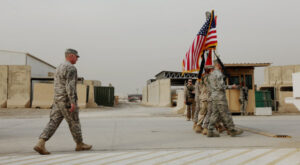 OVER a long campaign, it’s become maddeningly difficult to tease out concrete differences in how Barack Obama and Mitt Romney would deal with an angry, unmanageable world that at once craves and resents American intervention.
OVER a long campaign, it’s become maddeningly difficult to tease out concrete differences in how Barack Obama and Mitt Romney would deal with an angry, unmanageable world that at once craves and resents American intervention.
Iran? Mr. Romney promises toughness, decries the administration’s naïveté that it could talk with the mullahs and declares, when pressed, that he would bring about “crippling sanctions.” An amused Mr. Obama says he’s already checked that one off, leaving unsaid the cybersabotage that was directed toward Iran’s nuclear program out of the Situation Room. Afghanistan? It’s a race for the exits, with Mr. Obama at a fast trot and Mr. Romney at a brisk walk, now that he has discarded his primary-season vow that we stay around to kill the Taliban. Mr. Obama is helping funnel light arms to the Syrian rebels; Mr. Romney would send heavy arms, and neither can explain how they would separate secular rebels from jihadists.
These fine gradations — exaggerated for effect two weeks before Election Day — will presumably be on display Monday night at the final presidential debate. But with luck, viewers will get a glimpse of the real, gut-level difference in how these two men perceive the future of American power.
In Mr. Romney’s telling, America can — and must — restore itself to the glory days when it had unquestioned pre-eminence in the world. It was a brief, shining moment — that decade bracketed by the collapse of the Soviet Union and the destruction of the World Trade Center, when the United States was what the French called, with some derision, a “hyperpower.” A longing for that era lurks in Mr. Romney’s critique of what has gone wrong in the Obama years, which he describes as a messy age of jihadist revivals, new nuclear worries and a looming threat from Beijing, and an era in which, he wroterecently, “our country seems to be at the mercy of events rather than shaping them.”
For his part, Mr. Obama is a man who tends to live in the moment, reacting to the world’s problems while trying to define an emerging Obama doctrine, though it is a phrase the president never utters. To Mr. Obama, that unipolar moment is a gauzy memory. Those longing for it are pining for a global order that cannot exist again. The essence of Mr. Obama’s approach has been that the United States will act unilaterally whenever its direct interests are threatened — think of the Osama bin Laden raid or of the drone strikes and cyberattacks. But he has hesitated to act in cases where he believes others have greater interests at stake than we do: thus America’s halfhearted commitment to the military effort to oust Col. Muammar el-Qaddafi in Libya, and its refusal to take a major role in ousting President Bashar al-Assad from Syria.
If there is a lesson of the past decade, in Mr. Obama’s mind, it is that we can no longer afford to fight every war, insert ourselves in the middle of every dispute and get stuck in the muck of occupying nations whose fates are not central to our national interest. Nor can we stop rising powers from … well, rising.
“The United States does not seek to contain China,” Mr. Obama was quick to tell the Chinese on his first visit to Beijing, in November 2009, when he was less than a year into his term. “On the contrary, the rise of a strong and prosperous China can be a source of strength for the community of nations.” Old cold warriors cringed, but so did many in the president’s own party, whose biggest concerns about China focus on jobs and economic influence. It is a view Secretary of State Hillary Rodham Clinton gave voice to when she whispered to the prime minister of Australia on her way to Beijing in 2009: “How do you deal toughly with your banker?”
Mr. Obama has a tough task. It is a lot easier to go on the trail arguing for America as No. 1 than it is making a case that America’s leverage comes in its ability to work with allies. “It’s an incredibly difficult balance, especially for anyone running for president,” said R. Nicholas Burns, who spent nearly three decades as one of America’s top diplomats before he left his post as George W. Bush’s under secretary of state for political affairs to teach at Harvard. “Governor Romney is right to say America must lead, and we are still the indispensable power and must remain a strong and active world leader. But President Obama has developed a modern and effective view of leadership that I think resonates with anyone who has done this kind of work for a living: that in places like Libya, you have to challenge the NATO allies and the Arab states to be in the front lines, and that Americans know we can no longer be everywhere and do everything.”
Mr. Romney’s aides say he, too, will use American power sparingly. But the core of Mr. Romney’s argument is that the Obama approach is a sure recipe for slow decline.
Maybe these are the differences to be expected between a president who spent his elementary-school years in a yearning middle power in the Pacific — Indonesia — and a candidate who was raised in the glory days of industrial America, before the humbling of America’s auto industry became a symbol of things to come. Mr. Obama’s writings about his youth openly questioned whether American power was used wisely in the cold war years. Mr. Romney’s candidacy has been tinged with Eisenhower envy and almost pretends the Bush years never happened. Mr. Obama’s starts with the gritty reality that the response to the Sept. 11 attacks cost America $3.3 trillion and counting. One line kept coming back in his speeches on Afghanistan: “So we can’t simply afford to ignore the price of these wars,” he said at West Point, in late 2009, when he announced the “surge” that just ended, with a whimper, last month. “The nation that I’m most interested in building is our own.”
If that difference flares up anywhere on Monday night, it may be over the defense budget. This is the only part of the federal budget that Mr. Romney views as sacrosanct: he wants a bigger Army, and a Navy that builds 15 new ships a year, a 50 percent increase. It is part of his call for a more muscular America, one that can take on Russia if it ever lives up to Mr. Romney’s description of it as America’s “greatest geopolitical threat” (which Mr. Obama mocked in the first debate) and can keep China from pushing us back toward the middle of the Pacific.
But he has not, at least in his public comments, aligned that with a strategy of when and how he would have the United States intervene around the world. Would we re-enter Afghanistan if the Taliban tried to retake Kabul? Finish the job with American troops in Syria if it looked as if Mr. Assad would hang on, killing thousands more? Join in a military strike against Iran on the theory that America’s national interest must be identical to Israel’s?
So far, we don’t know.
MR. Obama, in contrast, has made clear that the era of sending 100,000 troops to occupy countries for years on end, only to leave amid fuming resentments, is over. His budgets reflect his doctrine: more for cybertechnology like the kind used against Iran, more for drones and Special Forces, and less for keeping a large armed force on hand. That became clear last December, when he gathered the nation’s combat commanders into the State Dining Room at the White House and, under the gaze of Abraham Lincoln’s portrait, told his audience the party was over. The defense budget had grown 67 percent, in real terms, in the decade since the Sept. 11 attacks, and was wildly higher than it was during the cold war.
So after the Pentagon asked for funding last year to keep 100,000 troops ready for “stability operations” around the world — the kind of operation the United States ran in Iraq and Afghanistan — the White House suggested they hadn’t read the memo: Mr. Obama is out of the occupation business. He seemed to take to heart the parting warning of Defense Secretary Robert M. Gates, the Republican who served under the last two presidents. On his way out the door, Mr. Gates said that anyone in his job “who advises the president to again send a big American land army into Asia or into the Middle East or Africa should ‘have his head examined,’ as General MacArthur so delicately put it.”
Mr. Gates’s view certainly seems to be in tune with the electorate these days. That explains why Mr. Romney has been so tentative about translating his call for a more muscular American approach to the world into specifics. He is trapped, to some degree, by the legacy of George W. Bush — while he wants to reject the Obama doctrine as too weak and unprincipled, he cannot bring himself to embrace Mr. Bush’s first-term enthusiasm for pre-emptive action, or his second-term argument that the United States has a moral obligation to rewire societies that can give rise to despotism or terrorism.
The question of when America should intervene around the world — and when to leave it to others — has been the subtext of most major national security debates here for the last decade. Syria is the crisis du jour, but it will not be the last weak state that threatens to devolve into chaotic, violent collapse — and become new territory for extremists. What we have not decided, as a country, is how much risk we are willing to live with as those states crack, collapse and are reborn. Mr. Obama has put together a nuanced approach that worked in Libya and has frozen in place in Syria. It will be up to Mr. Romney to explain if he has found a third way.
(The Newyork Times)













